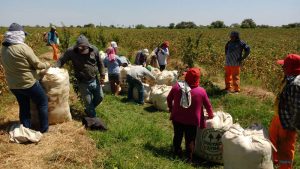 ZURICH — April 19, 2022 — Under the United Nations Economic Commission for Europe (UNECE) initiative to enhance transparency and traceability in the garment and footwear industry, Haelixa is now realising a pilot project with the Costach Cooperative and Peruvian textile company Creditex to give sustainable rural cotton producers in Peru more visibility in the value chain.
ZURICH — April 19, 2022 — Under the United Nations Economic Commission for Europe (UNECE) initiative to enhance transparency and traceability in the garment and footwear industry, Haelixa is now realising a pilot project with the Costach Cooperative and Peruvian textile company Creditex to give sustainable rural cotton producers in Peru more visibility in the value chain.
In 2019, UNECE and United Nations Centre for Trade Facilitation and Electronic Business (UN/CEFACT) have set up an initiative to drive transparency and traceability for sustainable value chains in the garment and footwear industry. The initiative is jointly implemented with the International Trade Centre (ITC) with financial support by the European Union. Haelixa is proud to be part of the group of experts that develops policy recommendations and traceability standards and conducts projects to set traceability benchmarks. With the support of the +Cotton Project, implemented by the Food and Agriculture Organization of the United Nations (FAO) and the Brazilian Cooperation Agency (ABC) a pilot is being realized in this context to mark and trace the finest Pima cotton for Creditex directly at the gin in Piura, Peru. Haelixa’s DNA marker connects the actual lint cotton to the entry on a blockchain system provided by UNECE. The Haelixa technology ensures that the information about the product origin and the journey of the product along the value chain is always safely embedded into the product itself. The marked cotton will be used to make exclusive pajamas sets for Cat´s Pajamas. DNA traceability will enable the verification of the premium origin of Peruvian Pima cotton in the final garment produced using sustainable practices by family farmers associated with the Costach cooperative.
Costach is the main cooperative of cotton farmers in Peru. The cooperative consists of 5,200 family farmers in the Piura region, producing mostly extra long fiber of Pima Cotton. Since 2017, the +Cotton project has been supporting the farmers with training on sustainable practices and has been providing technical assistance for improved markets access.
Adriana Gregolin, regional coordinator of the +Cotton Project said: “FAO, together with the Brazilian Cooperation Agency and the Ministry of Rural Development and Irrigation (MIDAGRI) of Peru, is supporting the strengthening of capacities of family farmers that represent around 100 percent of producers in Peru. This includes addressing and supporting them with key issues such as digitalization and market access to improve the rural development with equity that is now also enhanced by the UNECE traceability initiative”.
Maria Teresa Pisani, project-lead at UNECE, highlighted: “Traceability and transparency are key to ensure that environmental, human rights and social risks are effectively identified and addressed in garment and footwear value chains, particularly upstream. We are delighted to have our partners’ trust and commitment to UN/CEFACT standards to track and trace sustainability performance of cotton products. Tracing products from field to shelf and beyond is a right step forward to transition towards more responsible consumers’ choices and sustainable and circular business models in the textile industry.”
Ricardo Yarleque, general manager of Costach, commented: “For COSTACH it is essential to participate in traceability initiatives that allow the inclusion and give visibility to the important role of small family farmers in the production of Peruvian cotton. Peruvian cotton fibre is one of the longest and finest in the world, of highest quality and produced sustainably. Because we understand that without farmers there is no life.”
Creditex is vertically integrated from cotton ginning to fine thread, up to the production of high quality apparel for international premium brands. The company takes social responsibility and environmental stewardship very seriously and therefore makes a strong partner for this project, empowering the cotton family farmers that hold the majority of cotton production in Peru.
Ricardo Dancuart, Creditex commercial manager for the Yarn Division, said: “Sustainability and traceability of the products are now very important both for the final customer as for our global environment. We are very interested in this new way to follow the fibre from the ginning to the garment, whilst we at the same time improve all the processes to reduce contamination and damage caused by the industry, producing better and more durable garments.”
Gediminas Mikutis, CTO and co-founder of Haelixa, said: “Physical traceability becomes a key element in creating awareness for the producers of the raw material and manufacturers that are at the beginning of the value chain as consumers want to know who made their garments and under which circumstances they have been produced. For brands traceability provides not only an important mechanism to support their sustainability claims, but is also a great starting point for storytelling, giving their partners in the supply chain a face and voice.”
Posted: April 19, 2022
Source: Haelixa AG




